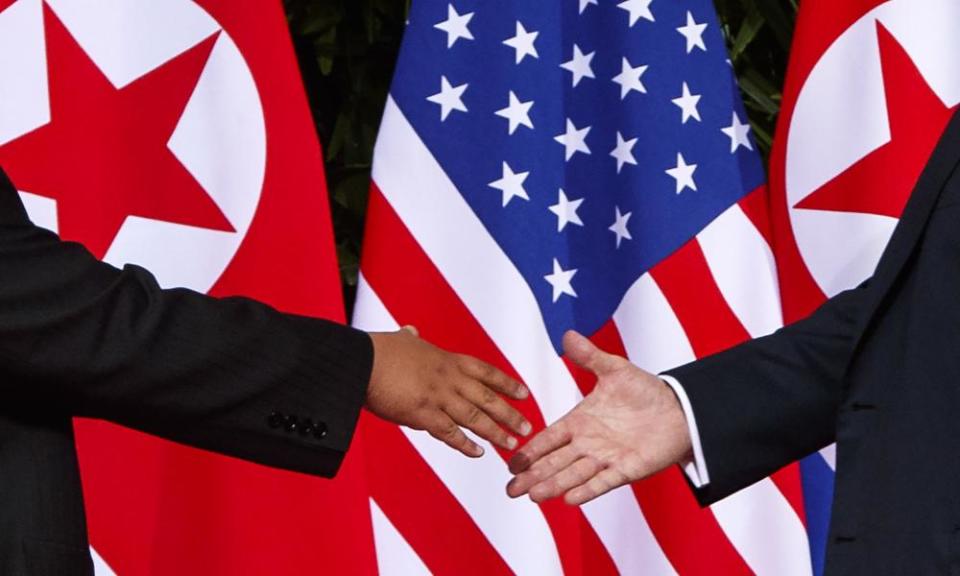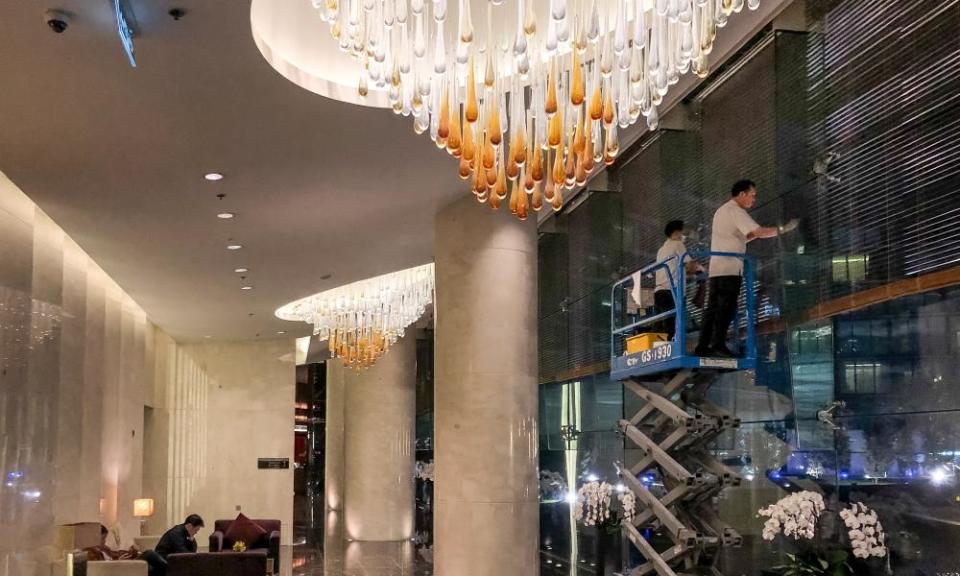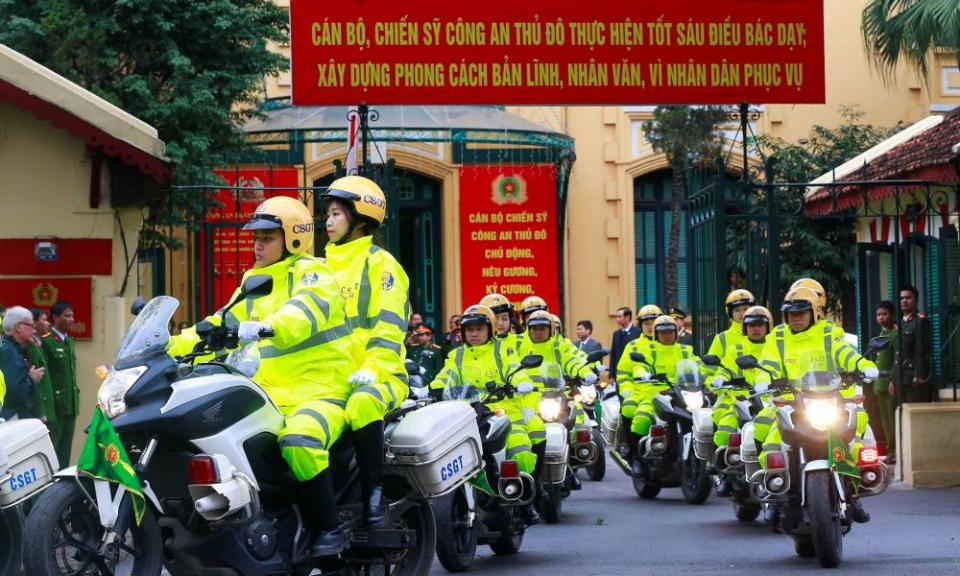US negotiating position in disarray ahead of summit with North Korea
Trump says he would be happy if rogue state continues with nuclear testing ban, handing diplomatic initiative to Kim Jong-un

Donald Trump has said the US will be “happy” if North Korea simply agrees to continue its moratorium on nuclear and missile testing at this week’s summit in Hanoi.
The US president’s remarks on Sunday night represented a lowering of already modest expectations for his second meeting with Kim Jong-un in Hanoi, due to begin on Wednesday.
The North Korean’s leader’s moratorium on testing began even before the two leaders’ first summit in Singapore last June, and followed the successful test of a thermonuclear weapon and two launches of an intercontinental ballistic missile (ICBM) in 2017.
At the Singapore summit, Kim Jong-un agreed to the “denuclearisation of the Korean peninsula” but it soon became clear that the US and North Korea had very different interpretations of what the phrase meant. Since then, the North Korean state has carried out demolition work at a nuclear test site and a missile test facility, but according to US intelligence estimates, has taken no substantial steps towards disarmament.
Adding to the uncertainty surrounding the US negotiating position, the US secretary of state, Mike Pompeo, suggested on Sunday that some sanctions on North Korea could be lifted before it dismantled its nuclear weapons programme, a relaxation of the Trump administration’s previous stance. Pompeo also suggested the Hanoi summit could last for just one day, instead of the expected two.

The public shifts in the US stance came as diplomats from both countries sought to make progress towards an agreement in preliminary talks in the Vietnamese capital, and Kim Jong-un’s armoured train made slow progress through China on the way to the Vietnamese border, from where the North Korean dictator was expected to complete his trip by car. Vietnamese officials announced the road from the border would be closed on Monday morning. Trump is due to fly out of Washington on Monday afternoon on his way to meet Kim.
“It’s a very interesting thing to say but I’ve developed a very, very good relationship,” he told US state governors at an evening event at the White House. He added: “We have a special feeling and I think it’s going to lead to something very good and maybe now.
“And we see eye to eye, I believe,” Trump said. “What’s going to happen, I can’t tell you ... I don’t want to rush anybody, I just don’t want testing. As long as there’s no testing, we’re happy.”
Trump surprised US regional allies in Singapore by announcing a suspension of joint military exercises with South Korean without consulting US military leaders or the government in Seoul.
Adding to the uncertainty this time, Trump will be meeting Kim when his former lawyer, Michael Cohen will be giving testimony to Congress and speculation that the special counsel investigating the Trump campaign’s links with Moscow, Robert Mueller, may be close to delivering a report on his findings.

“The big question with the Cohen testimony on Wednesday is whether Trump will give away too much,” Victor Cha, former director of Asian affairs at the US national security council. “Trump has so much personally invested in this ... and he really doesn’t care about the alliance [with South Korea]. He could put something on the table that really damaging the alliance.”
On Sunday night, Trump insisted: “I’m not pushing for speed, but we’re not removing the sanctions.” However, that apparently firm position was called into a question by remarks by Pompeo in a television interview before he left Washington on Sunday night to join the negotiations in Hanoi.
“Remember these sanctions cover a broad array of activities,” the secretary of state told CNN. “The core economic sanctions, the sanctions that prevent countries from conducting trade, creating wealth for North Korea, those sanctions are definitely going to remain in place.”
But Pompeo added: “There are other things we could do – exchanges of people, lots of other ways that North Korea is sanctioned today that if we get a substantial step and move forward we could certainly provide an outlet which would demonstrate our commitment to the process as well.”
When he announced the second summit, Trump had said that it would take place over two days, 27-28 February. Pompeo however, raised the prospect it could be cut short.
“Might be one day, might be two days. I’m confident that if it requires even more time, we’ll commit to that,” he said.
According to a diplomat familiar with the talks, the North Korean starting position is that since Pyongyang had suspended nuclear and missile tests, and partially dismantled two test sites, it was the turn of the US to make the first concession in Hanoi and relax sanctions.
Most US sanctions on North Korea are mandated by Congress and would be hard for the administration to lift. It would also be hard to convince US allies on the security council that the goal of UN sanctions had been met.
However, Washington could attempt to persuade the UN to make humanitarian exceptions to the sanctions, perhaps loosening constraints on economic cooperation between South and North Korea.
Pompeo declined to comment on speculation that Trump might offer a declaration about the end of hostilities from the Korean War, which were only suspended by agreement on an armistice in 1953. Such a declaration, leading to a peace agreement, is a longstanding demand of the Pyongyang regime.
It is unclear what the US would consider a “substantial step” from North Korea that would warrant the loosening of sanctions and a peace declaration. In his talks with his counterpart, the US special envoy for North Korean negotiations, Stephen Biegun, is said by diplomats from the region to have pushed for a clear definition of what “denuclearisation” means, a declaration describing the extent of the North Korean nuclear and missile programmes, a roadmap for future negotiations, and a timetable for disarmament.
However, Trump himself has undercut the demand for a timeline, and the US also appears to have backed away from the demand for an inventory of North Korea’s weapons programmes.
Among the more modest steps Kim Jong-un could offer in Hanoi would be admitting inspectors to North Korean nuclear sites. For the right incentives, the North Koreans have suggested that they would be ready to begin dismantling their main nuclear complex, at Yongbyon, possibly including its plutonium-producing reactor, and a uranium enrichment plant. The reactor however is nearing obsolescence and the regime is suspected of running up to three other covert enrichment plants elsewhere in the country.
Duyeon Kim, adjunct senior fellow at the Center for a New American Security, said a second summit that failed to achieve genuine progress towards disarmament “will botch any chance of rolling back Pyongyang’s nuclear weapons capability, which has advanced to unprecedented levels”.
“That will force the world to live permanently with a regime that has yet to learn the basics of being a responsible nuclear state and continues to violate human rights,” Kim wrote in Foreign Policy.
“The North Korean game plan is to ensnare us in long-winded negotiations, while enforcement of sanctions becomes lax or non-existent,” Sung-Yoon Lee, professor of Korean studies at Tufts University’s Fletcher School, said. “The North Koreans have a game plan. Trump obviously does not. For North Korea this is a matter of life or death. For the US, it is more like a hobby.”

